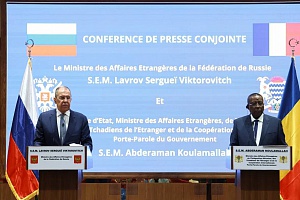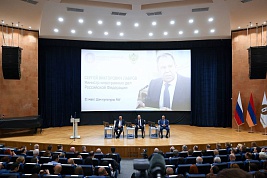Foreign Minister Sergey Lavrov’s answers to media questions during a joint news conference following talks with Abderaman Koulamallah, Minister of State and Minister of Foreign Affairs and Chadians Abroad of the Republic of Chad, N'Djamena, June 5, 2024
Question (translated from French): Chad and the Russian Federation have maintained diplomatic relations since 1964. The two countries signed a wealth of agreements between 1964 and 1974 concerning the economy, culture, technology and aviation. Could you give us a summary of the outcome of these agreements 60 years later?
Sergey Lavrov: We did not summarise any results today but rather spoke about our plans for the future, standing on our accumulated experience and following the strategic courses outline by President of Russia Vladimir Putin and President of Chad Mahamat Idriss Deby during their meeting in the Kremlin in January 2024.
In addition to the agreements you mentioned, we signed more agreements subsequently, including on cooperation in military affairs and military technology. There is a Memorandum on Foreign Political Consultations Between the Foreign Ministries of Russia and Chad that has been implemented since 2013. But we may consider modernising and updating it, to ensure that the memorandum aligns with the present-day world politics with its enormous scope of problems. President of Chad Mahamat Idriss Deby spoked about this extensively today.
We are developing cooperation in security. Chad is interested in it, considering that the terrorist threats in the region, associated with the destruction of Libyan statehood in 2011, persist. That event became the main source of terrorist and extremist activity that continues and even increases in the Sahara-Sahel countries, in West Africa and other parts of the continent.
At this stage, we have agreed to pay priority attention to the efforts that would give a boost to our trade and economic links and investment cooperation to reach the same high level as our political dialogue as well as links in defence and security, humanitarian affairs and education. There are several rather interesting proposals to this effect and President Mahamat Idriss Deby also mentioned them today.
We have agreed that our Chadian friends would communicate their wishes about the forms of cooperation and the sectors of their economy where they would consider presence of Russian economic operators useful.
A delegation of the Chadian Chamber of Commerce and Industry is attending the St Petersburg International Economic Forum. The chamber has opened a permanent representative office in Russia. It is an important and stable channel for exchanging opinions on what sort of projects would serve the interests of Chad’s economic development, contribute to resolving social issues and follow the principle of mutual benefit.
Our common view is that the tasks set last January at the level of presidents, must be our priorities. Today, we have discussed immediate steps to progress in these tasks. Our financial and economic government bodies and agencies dealing with investment and other associated issues will pick it up.
I believe we have had a constructive conversation and will keep working harder.
Question (translated from French): You have been touring Africa for several days now. Today, you are here. Can we say that this visit consists of assessing what has been achieved in Russia’s relations with Chad? We noted that there were several items on your agenda today, including education. Infrastructure is one of the topics we are interested in. What can you say about it? How will Russia assist Chad and other African countries?
Sergey Lavrov: Regarding infrastructure, as I have already said, we asked our friends in Chad to draft a list of economic and infrastructure-related proposals where they would like to work with Russian economic actors.
Our companies have built a positive track record when it comes to infrastructure. In particular, Russian Railways works in many African countries and has been coming up with projects to build railways and the corresponding infrastructure. If this sector is on the list of proposals that we will receive from our friends in Chad, the reaction will be positive on our behalf. Let me emphasise that we have a wealth of experience in this sector.
Question (translated from French): The Western policy of interference in the domestic affairs of sovereign states caused the Ukraine crisis. What is Chad’s attitude towards the Western approaches to regime change and its failure to respect the independence of other countries, or the traditions and values of their people?
Sergey Lavrov (after Abderaman Koulamallah): First, we fully respect Chad and other countries in their position which consists of emphasising their neutrality. Just like Chad, we would also prefer talks. Moreover, these talks took place in April 2022, at Ukraine’s initiative, when Ukraine came forward with a basic outline of a peace treaty and a settlement. We agreed to these principles, and both sides initialled this text.
But then the Kiev regime’s Western masters prevented it from signing this document by saying that it must fight in order to inflict what they called a strategic defeat on Russia. For that, the West said, it would supply Kiev with the cutting-edge weapons. This is what they are doing right now. They have been delivering long-range missiles and publicly telling Ukraine to attack any target on the territory of the Russian Federation. In the meantime, they are convening a would-be peace conference in Switzerland. It is scheduled to take place in ten days.
But where do these two lines meet? It is hard to understand that. You can either stand for inflicting what they call a strategic defeat on Russia, or for holding peace conferences. But if you side with the peace cause, this probably means that, as Mr Koulamallah has just said, all the involved parties must contribute to finding a solution, instead of convening a conference in Switzerland for reasserting or supporting Vladimir Zelensky’s infamous formula without any reservations. This formula boils down to an ultimatum and implies Russia’s strategic defeat. And we are supposed to voluntarily accept it.
Peace is not what the organisers of this conference want. In their efforts to ensure that countries representing the Global Majority attend this conference, they are guided by the following principle, and have been quite open about it: it is up to you to choose sides, whether you stand with us, or with Russia. We will punish those who side with Russia. This is what this conference is all about.
Lastly, and I hope that I am not revealing any secrets here, many African leaders, just as President of Chad Mahamat Déby Into said today, have long pleaded for mutual respect among all countries around the world. We have heard more than once that the time when Western ambassadors could walk into the offices of African presidents and order them to act in a certain way are gone. Thank God, we have put this behind us.
What is now happening in Ukraine is following a post-colonial pattern. Senior government officials of the Kiev regime receive their instructions from Western ambassadors. So it is up to you to draw the conclusions. We state our position in all honesty.
Question (translated from French): You said that Chad was setting an example for other Sahel states, while facing security challenges. Is Russia ready to help Chad deal with these grave challenges? If so, then how?
Sergey Lavrov: I covered this topic in detail on two occasions today. I have mentioned the agreements on defence and military-technical cooperation, which the Russian Federation and the Republic of Chad signed long ago. These agreements were not left on paper; they are being implemented. The Chadian armed and security forces receive Russian weapons and military equipment that strengthen your country’s defence capability and enable it to fight terrorism more effectively. This cooperation will go on.
Question: Russia and Chad discussed major joint projects in geological exploration, the use of subsurface resources, and nuclear power production in Chad. Have you managed to reach some specific agreements? Maybe some companies are ready to come here, aren’t they?
Sergey Lavrov: We did reach certain specific agreements. Our Chadian friends will soon compile a list of projects, in which they would welcome Russian corporate involvement. The areas you are talking about – power industry, agriculture, etc. – we have mentioned them, too. President of Chad Mahamat Idriss Deby was particularly interested in peaceful uses of nuclear energy. He mentioned the experience that Russia’s Rosatom Company, one of the world leaders in peaceful uses of nuclear energy, had amassed while cooperating with African countries (and not only African).
We will expect concrete proposals from our Chadian friends. We are ready to send down an economic mission to discuss promising projects on the ground. We have reached an agreement on this today.
Question (translated from French): Will relations between Chad and the Russian Federation affect the relationship between France and Chad?
Chad is supporting other countries, specifically neighbouring countries like the Sudan. Can Chad strengthen relations with other countries? What is your position? There are many migrants in this country now. Isn’t this the consequence of the Sudan developments?
Sergey Lavrov (after Abderaman Koulamallah): Efforts are being taken by Chad and likely to be taken by other countries to bring peace back to the Sudan… There is no doubt that this war is pernicious. It already involves refugee flows and terrorist threats. As in other cases, all sides should sit down to the negotiating table and come to terms on the mode of living for their people.
Let me remind you that the Sudan’s problems are of long standing. At some point, the United States started to insist that the Sudan must be divided into Sudan and South Sudan and had its way. President Omar al-Bashir cooperated within the framework of this agreement. It would seem that Washington had reached one of its foreign policy goals. Soon, however, the United States “took offense” at how both Sudan and South Sudan behaved and introduced sanctions against them. The “experiment” has failed. They want to spit on people’s destinies, and will only mind their own interests. Right now, everyone must stop and engage in negotiations. Like in Libya or any other crisis area.
We support what Chad is doing. We also understand that it is one of the most heavily dependent states in terms of the consequences of that confrontation.
As for your former question, I can guarantee that out friendship with Chad will in no way affect our relations with France. France has different approaches. It proceeds from the assumption that either you are with us or against us.
I recall an episode that happened at the UN General Assembly session some five years ago. The then French foreign minister, Jean-Yves Le Drian, and EU chief diplomat Josep Borrell approached me and started asking questions, like why we were sending Russian military instructors to Mali? I was taken aback and asked: What’s the problem? The legitimate Malian leaders had asked us to. I explained that their request related, among other things, to the fact that the French were withdrawing their armed units from Mali, where they were supposed to fight terrorism. But I was told once again that Mali was a “French influence zone.” As simple as that.
We have a different principle. We are friends with those who want to be friends. We never ally with someone against someone else.



